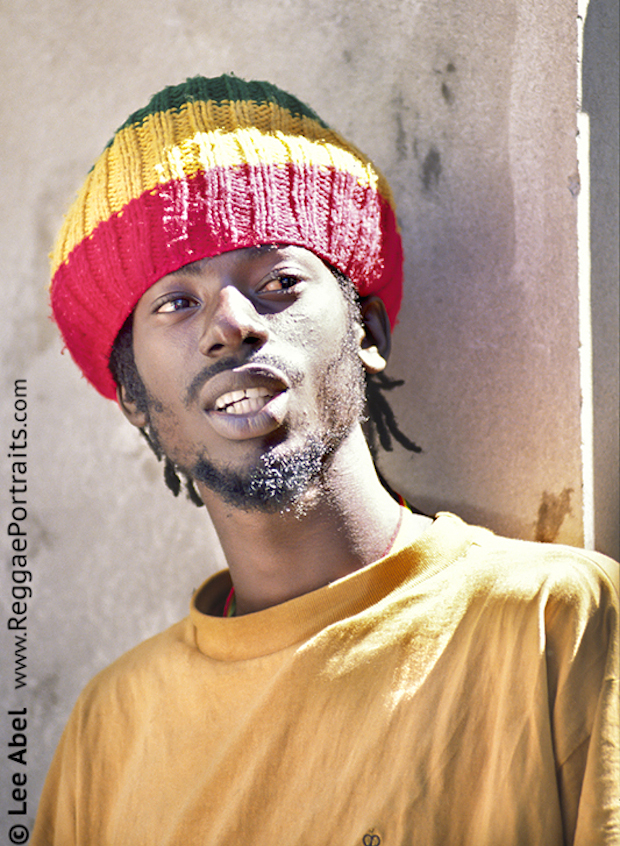
Celebrating The Gargamel’s EarthStrong with a Classic ’95 Boomshots Interview from the Til Shiloh Era
Forty one years ago today Mark Myrie was born in Kingston, Jamaica. By the time he was 19 he’d become the biggest dancehall star on the island with two smash albums—Stamina Daddy and Mr. Mention—under his belt. He soon signed to a major label and began to tour the world, a ghetto youth expanding his horizons in every imaginable way. And then in 1995—19 years ago this Friday July 18th—he released Til Shiloh, an album that marked a turning point in his career. With songs like “Untold Stories,” “Murderer,” and “Til I’m Laid To Rest” Buju announced a musical and spiritual rebirth, shaking off the bad boy pose that had stigmatized him in certain circles. Today Buju sits in federal prison, having become the target of a convicted coke dealer turned informant who ensnared him in an elaborate sting operation. The artist was convicted despite a highly problematic trial. We offer this interview (which first appeared in Ego Trip magazine) as a reminder of the artist that many know and love and a ray of hope for the future. If as he says his life is an open book, perhaps the final chapter has yet to be written. Interview After The Jump…
Photograph of Buju in 1995 by Lee Abel
Since his first few releases electrified the international dancehall massive in 1989, Buju Banton has been that rarest of deejays: a true original. It wasn’t his gruffneck style delivery that made him an innovator (Tiger, Prince Far I, and Pompidoo had all chatted lyrics in a raw-throated growl). It was his phrasing, his energy, his unwillingness to jump on a next man’s style or pattern. It was the way he constructed his architecturally innovative flows, sliding and gliding over hills and valleys, ludicrously speedy and infectious with the slo-mo.
Suvh sonic pleasures aside, Buju had a knack for touching a nerve every time he opened his mouth. First it was the controversy over 1991’s “Love Mi Browning,” a number-one tune that enraged dark-skinned sisters around the world. (Buju recovered their love with a crucial followup: “Don’t get me wrong because me love black woman.”) But that controversy was mild compared to furor that resulted when a gay-bashing tune Buju had recorded as a young teen was transliterated by a gay rights organization and published on the front page of the New York Post. “Boom Bye Bye” became a scapegoat for the beliefs and biases of an entire nation, and Buju was held up as the poster-boy for a genre that was branded as “Hate Music.”
Since then, Mark Myrie has grown older and wiser and done everything within his power to live that reputation down. He has found spiritual redemption through the Rastafarian faith, which he proclaims through anthems like “God of My Salvation.” His “Operation Willy” foundation educates Jamaican youth about AIDS and provides for Jamaican children living with HIV. His Cell Block 3-2-1 label (“Riddims in Custody Breaking Free”) continues to develop local talent. And most of all, his brilliant new album, Til Shiloh, (Loose Cannon/Mercury) is literally redefining and expanding the dancehall genre. It has earned raves from publications as diverse as VIBE and the Village Voice, which once treated Buju more like a monster than a musician. And it’s not just the armchair critics who are feeling it: “Til Shiloh is like a Michael Jackson record,” says the notorious New York DJ Selector Seeborn, “They be playing every cut.” It is fair to say that Buju’s latest will join albums like Spear’s Marcus Garvey, Uhuru’s Red and the Wailers’s African Herbsman on that short list of reggae recordings for the ages.
In May 1995, Buju dropped by my New York City offices with an advance cassette tape of Til Shiloh. We locked the door, blazed a fire, and let the music run wild and free. As my speakers were cooling down, the following conversation took place:
I’m literally blown away. This album is the lick.
I see this as a total compilation of my concept of the music and how I feel about this music in depth, you understand? And the world is given a chance fi get a glimpse of that feeling [Buju laughs] from one end to the other.
There’s all different styles on the album—digi riddims, acoustic guitars, African drumming and chanting. Would you call this a dancehall record?
I would consider this a reggae record, cause this whole thing is reggae, you know, despite whatever fusion. Too much fusion bring about too much confusion and everyone want to carry the music into a different channel. Hence people will either determine that this is dancehall or reggae or calypso or whatever. But as far as I am concern, this is reggae music. Don’t abuse it.
I notice that since the last time you and I spoke, a lot of things have changed. Not only has your music have evolved in major ways, but these days you’re a dreadlocks Rasta. Tell me how that decision came about in your life.
Well is not a decision, you know. Is more that knowledge increase through the passage of time. Through the passage of time all this has been happening. And my life is an open book. [Laughs.]
So were there any people who were instrumental in bringing about this increase of knowledge?
Well, this increase of knowledge come from the spiritual feelings that one feel inside. Because everything is not just everything, you know. Is the Almighty God create every man, so you just haffi live this life while we deh pon this earth fi live. From it is a positive life, we just haffi keep on spreading a joy.
When did you first start growing your locks?
Well I actually started growing my locks about a year and a third ago. I decide fi take the Nazarite vow and make sure everyone around I know say Rastafari is the way and this train carry no unholy. Remember, if Jah no inna the midst, the world is against us. If Jah is in the midst, who can be against us? Selassie I we magnify, me bredda, every time.
There’s talk of a revolution in reggae right now. Teachings about life and the words of Jah are coming out again in the music. How strong is this movement?
Well, is not really a movement. Is just what is to happen. Is revelation. You understand?
I think so. Like a fulfillment of prophecy?
Revelation. Cause the people need to hear the good, the bad, and the indifferent in these times so they can choose what is good for the ear. Therefore, you have all manner of music being made and being created.
It seems like right now the predominant style you hear playing in dance is tune about God and tune about life and reality. Not so much X-rated tunes and badness…
Everything is just for a while. All who inna the music business, all the veterans from before my time and your time will tell you music is a revolving thing.
It moves in a circle. What comes around goes around.
Yeah.
Let’s talk about some of the songs on this album, which seems to cover all the points on that circle, but always in an upful way. Which of the songs here stands out to you?
All of them are outstanding as far as I am concerned. Cause each of them play a different role inna my life and people life. “I Wanna Be Loved” express exactly the way I feel.
Not just a “tune for the girls,” but love in every aspect.
Selassie I love is the greatest love.
True. And what about that tune with the acoustic guitar… “While I’m Living” [“Untold Stories”]?
“While I’m Living” is also a favorite of mine and that song express itself and speak on a lot of issues affecting us as youths, peronally. Pleasing to the in-depth listener’s ear, and it can be a crowd’s favorite also. There is also a track entitled “Till I’m Laid to Rest” which you all have to check out, plus the interlude at the beginning, which is also exceptional. “Strange feelings I’m feeling, but Jah love we will always believe in. Though you may think my faith is in vain, Til Shiloh we’ll chant Rastafari name.”
What does the word ‘Shiloh’ refer to?
Til Shiloh means forever. Until judgment.
I have to ask about the track with you and the late Garnet Silk, or the “Archangel” as you did describe him on the track.
Well that track was done quite some time before the disappearance of our bredren, but everything was for a wise purpose, you know, cause that song was like a reasoning, ike a communication. And that song is also a deep favorite of mine, seen?
Yes I
Words can’t explain, you know? The vinyl or the CD remain. [or the YouTube upload!]
Music alone shall live. Last year at Sting you made a comment on the mike regarding Garnet’s death, what was that about?
Well, all I say was Garnet was a good youth and I wonder if his killing was really murder, seen? Till the end of time I’ll continually wonder if… Selassie know say, “I could go on and on, the full has never been told.”
Were you the first one to suggest that some foul play was involved in Garnet’s death?
No, no, that would sound like I was inciting a riot right away. It was open and evident for the mind to check. It wasn’t an enclosed situation, cause Jamaica is not like certain places… Every man within themselves did a check out the vibe fi see for themself and analyse the situation. It was evident what had happened and everyone can analyse it his way or her way at the end of the day.
Some people say it was a bullet from his own gun that caused the fuel cylinder to explode, others say he was shot before the fire burned up his house. Do you think the truth is ever going to come out?
If there is any more truth fi come, but the death is already there. That is truth.
Reality
Reality in other words the loss of a loved one, you know?
Your song “Murderer” is one of those songs that no matter how often I hear it gives me chills every single time. What was going through your mind when you wrote a line like “You ever think about your skull getting bore?”
When I wrote that song I was in Japan—just finish a concert and call Jamaica to get an international linkage and I heard that Panhead was dead. The musical inspiration just came from above, and vibes flow through the pen, you know. I rehearse it in Japan, when I did the last show live on the air in Tokyo. When I came to Jamaica I recorded it the following week and the sentiments and the vibes were just so spiritual. The message and the whole content, that song was relevant at that time. And Jah used us as His vessel like Him say.
And it seemed like “Murderer” was the beginning of a whole wave of consciousness returning to the music. So many other people recorded their own versions of that tune. It was just a powerful moment in reggae, wasn’t it?
Very powerful, but gi’ Jah the glory cause we always did do a works you know. Give Jah the glory.
Break it down for those who don’t know yet: who is Jah?
When we say Jah, we mean the omnipresent one, Almighty God who supreme over all, Haile Selassie I Himself, you know. Cause we done know say a Christ in His Kingly Character, so hail to all bredrens and sistrens in that divine name you know. Seen? Ah just strength and unity through the medium of the music.
It seems like reggae and Rasta have always gone hand in hand.
Well nuff a wolf in sheep’s clothing still you know, and I say lightning, fire, and brimstone, cause no false prophet shall lead Jah children to a false throne, you understand? Make love not war, man. Only that alone can get you far.
You did a tune with Tony Rebel, about how “Nuff No Love the Buju But A So it Go”
That song was written in London in 1992, when we were on tour Penthouse showcase in Birmingham. Moment before we got an earthquake attack and we had to evacuate! We were just chanting down and writing the song, and we didn’t even fear. Everybody evacuated, but we were the last ones to come out. We were just walking slow, chanting the song. We came out of the hotel and we saw everyone standing on the sidewalk.
What was it you were chanting?
We were saying “Lord is my shepherd I shall not want,” you know. “Baldhead and nattydread inna Birmingham a chant.” It was released in 1994 by Donovan Germaine, Penthouse. Just to show you the power of music. It has no time, it is limitless.
And I guess music has always been part of your own spiritual development, right?
Spiritual reasoning and spiritual gathering haffi gwaan. You have the gathering of Israel, where all of us gather and burn we seven fires and we reason ’bout Jah and ’bout the world and we reason ’bout the current crisis and difficulties facing the youth. You understand?
How many people come together for these gatherings?
Well the gathering of Israel is a large gathering you know, an undetermined amount of people. All ah we a Israel. So the spirituality come also from the gatherings, you know, the strength from one man automatically flow to another or from a sistren to another sistren, and everyone strong up.
What about the ceremony that went on last Christmas after Garnet’s passing? I heard there was some powerful chanting going on.
Yeah, I was there with my Kete drum. The vibe did deh deh, chanting with the seven fires same way.
What are the seven fires?
Well we see our King and Saviour move with the seven fire, you know. So we nah depart from him teachings, nor from the way we should live, as Garnet would have said. “Lord watch over our shoulders tonight and help us do thy work tomorrow. Let’s not forget where we are from. Father show us the way to go.”
Is this a prayer?
Nah, that is a song of Garnet’s.
Just lyrics. And what are the lyrics that you perform with him on the album?
Well I say “Let Jah arise and the heathen scatter, have to give thanks and praises no matter, even if the flames get hotter and hotter, everybody should ah know and don’t believe inna rumor. Children arise from your sleep and slumber, no come yah so fi bow, we come yah so fi conquer. Strictly love why you envy your brother? Don’t let them rearrange you in a different manner.” That’s the utterance, you know?
What else do you want to say?
Well I just wanna reach out and touch everyone heart—not with mi hand or with a gun, you understand, despite the thoughts of some. We just wanna show you that music alone is the medicine. You can be on earth and still feel like you are in heaven. Let Jah come into your heart and give the music a thought. Selassie I.
Give thanks.
RELATED: Stephen Marley, Damian Marley & Buju Banton “Jah Army” LIVE
Subscribe to Boomshots TV
Follow @Boomshots



[…] 4. Reasoning with Buju Banton: “My Life is an Open Book” Celebrating The Gargamel’s EarthStrong with a 1995 interview that originally appeared in ego trip Magazine. By Boomshots. [Boom Shots] […]
[…] RELATED: Reasoning with Buju Banton inna 1995 […]
[…] Banton’s music became more influenced by his Rastafarifaith, as heard on the seminal albums Til Shiloh and Inna Heights. In 2009 he was arrested on drug-related charges in the United States and his […]